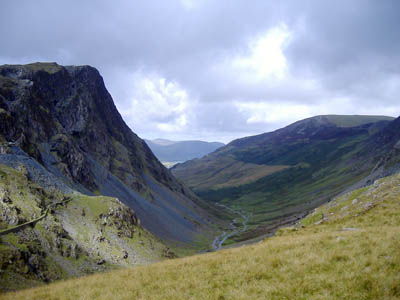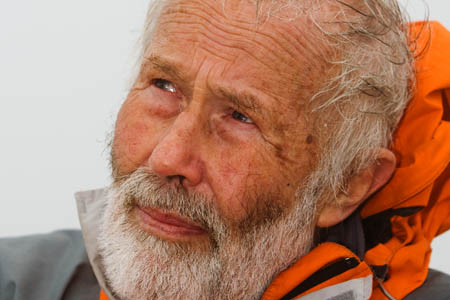
The slate mine owners wanted to build the zip-wire from the crags on the left, to the car park below. Photo: Alan Faulkner CC-BY-ND-2.0
National park planners have rejected a controversial bid to build a white-knuckle tourist attraction on a Lake District mountainside.
The proposal, for the longest zip-wire in the northern hemisphere, was thrown out by the national park authority despite support from Everest summiteer and Cumbrian resident Sir Chris Bonington.
Members of Lake District National Park Authority’s development control committee took three hours before turning down the plans, submitted by Honister Slate Mine, by nine votes to five.
The company, which was founded by the late Mark Weir who died when he crashed his helicopter on the fell close to the mine, wanted to build the 1.2km long aerial slide to complement its existing tourist attractions at the site, including a via ferrata, which non-climbers can use to get a taste of mountaineering using fixed protection, wires, and rungs.
The plan was to build the zip-wire from near the summit of 658m (2,159ft) Fleetwith Pike down to the slate mine car park.
A report from the national park’s head of development management David McGowan said the zip-wire was ‘one of the most unusual planning applications in the national park in recent years’.
His 110-page report said that while other applications may have been more significant in scale, few had captured as much public interest, with 476 letters of support, a 11,500 strong petition in favour, and 255 letters opposed to the scheme.
Supporters said the zip-wire would provide new employment opportunities; support the tourism economy; encourage younger visitors to the Lake District and be a natural extension to the industrial history of the Honister area.
But objectors to the scheme claimed the scheme would affect the visual appearance of the national park; create extra traffic on narrow roads; be a hazard to walkers; cause noise, be a distraction for motorists and harm nature conservation.
The matter was debated today at the Kendal headquarters of the authority, with Sir Chris addressing the meeting in support of the mine owners and the landscape charity the Friends of the Lake District speaking against. Ironically, Sir Chris is vice-president of the Friends.
Mr McGowan told the packed meeting this was an extraordinary application and members had to make their decision based on both individual values and those of the organisation, to take into account the balanced issue of the zip-wire in the landscape.
The Friends welcomed the planners’ verdict. Planning officer Richard Pearse said: “We’re very pleased with the decision. It’s a victory for the environment, it’s victory for national parks and what the they stand for: free access to an outstanding natural landscape.
“The economic argument for this development was not overwhelming, and it should not outweigh the fundamental damage it would have caused to one of the most outstanding areas of the country.
“Adventurous outdoor pursuits are available all over the Lake District, in the form of rock climbing and mountain biking for example, and are enjoyed by large numbers of young – and not so young – people, in harmony with the environment.
“The scale of this proposal in this location was inappropriate however.
“The decision reflects the strength of feeling and quality of arguments put forward by a wide group of organisations and individuals, who, like us, all believe that the open fell tops, free from man-made developments, should be protected for everyone’s benefit.”
The park authority’s planning officers had made no recommendation to the committee members.

Gerard Hepton
07 September 2011YOU CAN HAVE RAILWAYS UP MOUNTAINS IN SCOTLAND AND WALES YOU CAN HAVE CABLE CARS IN THE ALPS YOU CAN HAVE WIND TURBINES BUT NO ZIP WIRE, HOW STRANGE ?
Ben Price
07 September 2011A Zip wire wood have very little impact on the visual aspect of Honister - minimal environmental impact & would be a huge attraction & boost for the area. The only negative would be the increased traffic on fairly narrow roads which could be helped by improved public transport in that area.
Once more 'Friends of the Lake District' & other such group have shown themselves to be behind the times. A huge proportion of visitors to our area are ageing, we needed ( & still need) new projects like this to attract younger people who may be tempted by overseas adventures to experience what they have on their own doorstep
Mick
08 September 2011A good decision.
Theres too much carte blanche tourism development in the Lake District with little going back to the local communities. Its a fallacy that tourism always brings wealth to an area, in the case of the Lake District it only benefits a small sector of society and this particular development would have only boosted the pockets of the Honister Slate Mine share holders.
Personally I'd like to keep the fells as the fells, and not make them some huge adventure theme park for the urbanite masses.
John
09 September 2011I think they've made the right decision.
Ruth Cole
23 October 2011I hope Mark's company will resubmit their application, revise it maybe and take into account some of the objections. New ideas are often resisted at first. I have teenage children and they would love to go on the via ferrata or the zip wire. Trudging up the fells is not for them yet they would appreciate how wonderful the scenary is given a more exciting activity like the zip wire.
Ruth Cole
carol gibbons
06 April 2012What a fantastic idea, you can go round the world and there is always an attraction better than you can find in the uk, for once let the uk be better than the rest. All ages could enjoy the thrill of the ride and the fun of the climb. Good luck with future applications.